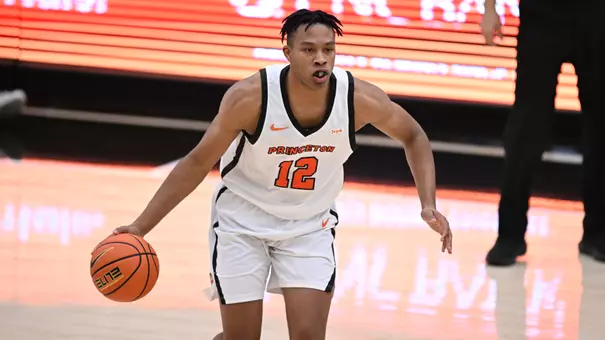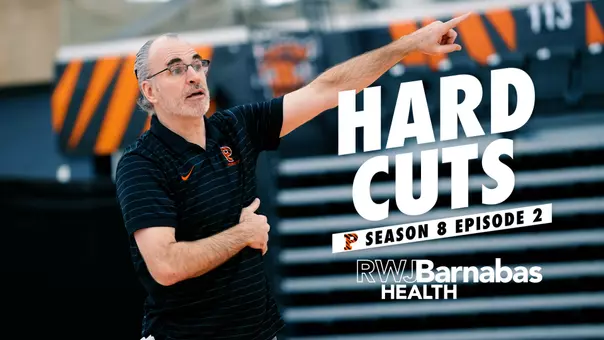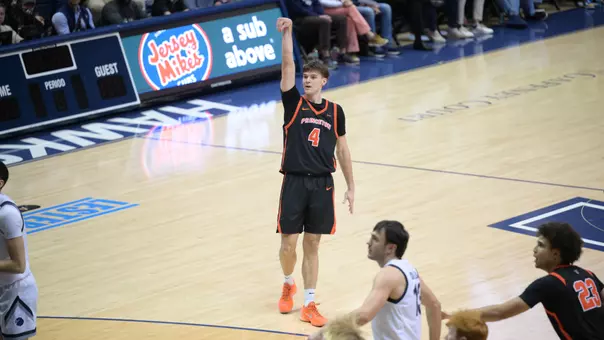Princeton University Athletics
Nate4Gov? Why not?
September 03, 2003 | Men's Basketball
Sept. 3, 2003
Doesn't matter who you are. Professor. Teammate. Coach. Reporter.
When Nate Walton speaks, your natural inclination is to listen.
Some people are like that. They lead. Others follow them.
It's like Pete Carril used to say: You can't separate the person from the player.
Nate Walton lives like he played basketball at Princeton. His walk is confident and assured without any fake bravado. Same with his speech. He is funny and loose all the time, yet he knows exactly when it's time to become deadly serious.
He is, for lack of a better way of putting it, the personification of California Cool.
And once you understand all of that, you come to the same conclusion he did: Why not Nate Walton?
Nate Walton, Class of 2001, can be found in two places this fall: the Stanford Business School and the ballot for governor of California. "Princeton was the greatest place for me," Walton says. "It's inspired me to try to do great things in my life."
Walton has been pointed in the direction of activism and public service his entire life. Both of his parents - his mother Sue and his father Bill, the Hall of Fame basketball player, who divorced when he was young - have stressed to him the importance of addressing the larger issues in society, and he has taken the Princeton motto "in the nation's service" quite literally.
Nate Walton attended high school in San Diego before coming to Princeton, where he was a politics major.
"Although the roots of my interest in politics are because of my parents' activism, I didn't understand how important politics were until I started studying at Princeton," he says. "I wouldn't be doing this today if it hadn't been for the classes I took at Princeton."
Walton had been working in New York City with a human rights group while waiting to start work on his MBA at Stanford. He was home for the summer relaxing on the night that Arnold Schwarzenegger announced on Jay Leno's show that he was going to run for governor as part of the Gray Davis recall vote.
"I couldn't believe that Arnold Schwarzenegger could be governor of my state," says Walton. "It shows how apathetic people are. I said I was 10 times smarter than Arnold Schwarzenegger, and my family told me to do something about it."
To be on the ballot, a candidate needed to secure 65 signatures of registered voters and pay a $3,500 fee (or, to avoid the fee, get at least 10,000 signatures). Walton's father promised to pay the fee, and the 25-year-old would-be governor set out to collect the signatures.
"It was easy," he says. "I got some in my neighborhood. I got some at the beach. I got some at the Eagles' concert."
Don't be fooled into thinking that this is all a joke to him. While he is not actively campaigning all day until the Oct. 7 election, he has done many television, radio and newspaper interviews. He has good name recognition through his father, arguably the greatest college basketball player of all-time, and his brother Luke, who plays for the Los Angeles Lakes.
Once the cameras and microphones are turned on, Nate Walton can more than hold his own. Unlike many of the candidates in this election, Walton is extremely well-versed on issues facing California, and he never flinches when asked for a position. His Web site (www.nate4gov.com) features his stands in several key areas, and he expresses himself extraordinarily well, whether or not you agree with his positions on the environment, the cost of higher education, the state of mass transit, oil drilling and the general state of the country.
"To me, it's an exercise in activism," he says. "I enjoy politics. I'm trying to get to talk to as many people as possible, especially young people. Young people care about their society, but they don't care about politics as much traditionally. I can't believe how many young people have come up to me and said they'd vote for me. A lot of these people are people who would never vote."
To say that Walton's politics lean to the left is to say that he was a pretty good passer at Princeton. Walton and Mason Rocca were Carril's last recruits in 1996, but Carril retired before they started that fall at Princeton.
Instead, Walton was part of Bill Carmody's first two teams, which went a combined 51-6 overall and 28-0 in the Ivy League. A forward or center, Walton was the sixth man on the 1998 team that went 27-2 and advanced to as high as seventh in the national polls.
Like his father, though, Walton was blessed with bad feet, and an operation early the second season wiped out the entire school year for him. He returned a much more mature person the following season, Carmody's last at Princeton as it turned out, and helped the Tigers to a 19-11 record and the NIT. His assist total of 113 for the year was the fifth-best in school history.
It was in the following season that Walton earned for himself a unique position in Princeton basketball history. In a much-chronicled few months, Carmody and assistant Joe Scott left for other head coaching positions, and no fewer than five potential starters all left the program, including All-America center Chris Young, who became a professional baseball player.
Picked as low as fifth in the league after that, Princeton regrouped under rookie head coach John Thompson and senior captain Walton. With a completely unheralded team, the Tigers put together one of the most glorious seasons any Princeton team has ever had, culminating with a 68-52 win over Penn at a delirious Jadwin Gym that nailed down the Ivy championship. Walton, who had simply carried the team all season, was at his best that night, playing a nearly perfect game with nine points, eight rebounds, seven assists and six steals. He finished with 115 assists, two better than the previous year, to become the fourth player in school history with two seasons of at least 100 assists. His career total of 270 is sixth-best all-time at Princeton. He was a unanimous first-team All-Ivy selection.
Beyond basketball, he also had an avid interest in politics and the salient issues of the day, and his debates with conservative teammate Pete Hegseth were the stuff of legend.
"Pete said he'd be my campaign manager," Walton says.
Walton went to play professionally in France after graduation while also working towards an MBA, but his team went under and he returned to the United States. In addition to the election - voters will cast two votes, one to decide whether Davis is recalled and a second to select the candidate to replace him in the event the recall is successful - Walton is just beginning his graduate work at Stanford.
"The people here think it's interesting," he says of his new classmates. "For me, it's been overwhelmingly about talking to people about issues. It's hard to explain to people who don't live in California. I'm living in the guest house of a woman who is 75 years old, and she thinks what I'm doing is great. People understand what point I'm trying to make as a 25-year-old grad student."
And when he's a little more settled? Is this the start of a career in politics?
"I'm not sure," he says. "Let's call it an experiment. I'm going to vote 'no' on the recall. To me, that's not the way to go about democracy. At the same time, this has been too good an opportunity for me. And it's been a lot of fun, getting out and talking to people."
California could do worse.












